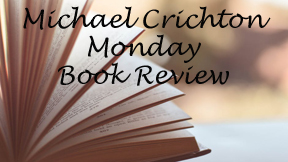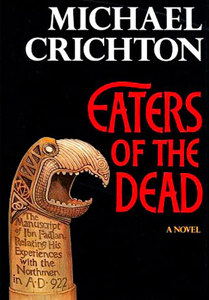Michael Crichton might be the most versatile bestselling writer ever, but even by that standard, “Eaters of the Dead” (1976) is his most different novel. My relationship with this book has been one of both disinterest and appreciation through the years.
Going through my first Crichton phase in the 1990s, I left this one for last; the title is so horrific, plus it’s not about fairly recent history, like “The Great Train Robbery,” but old history – set in the 10th century.
Updating ‘Beowulf’
On the other hand, Crichton does a service here by updating the epic poem “Beowulf” – which he describes (channeling common perception, not his own) as “one of the great bores … no longer read willingly by anyone.”

“Eaters of the Dead” (1976)
Author: Michael Crichton
Genre: Historical fiction
Settings: Scandinavia, Iraq, 10th century
The author reworks the poem as a novel, again using his favorite trick of pretending this comes from a real uncovered source – in this case a text by Ahmed Ibn Fadlan. The Arab scribe visits the Vikings (including warrior Buliwyf) and joins them on a battle against “monsters of the mist” called wendols.
Simply put, I’d rather read Michael Crichton’s “Beowulf” than the actual “Beowulf” for reasons of laziness and accessibility.
Disgusting details
Beyond making the story easy to read, the author’s primary strength in “Eaters of the Dead” is details. I can smell the Vikings, who don’t bathe or wipe their butts.
All narrators are naturally sympathetic, but this is very much the case with Ahmed Ibn Fadlan, the audience surrogate. I’d huddle in a corner with him – a Muslim from Baghdad who is much closer to the modern world than the primitive Northmen – to keep my distance from these brutes.
Still, Crichton reveals present-day biases by showing how the Vikings’ responses to things make perfect sense to them, even if they are bizarre to Ibn Fadlan (and us). For example, death is a big deal – daylight horror like “Midsommar” comes to mind with the description of a king’s funeral – yet no one grieves. Death is a natural part of life to them.
Perilous journey
“Lord of the Rings” also comes to mind in this adventurous story that uses an A-to-B-to-C approach without much foreshadowing but makes up for it with a supernatural tinge – the idea that we’ll get something wild in upcoming pages even if we have no idea what it’ll be.
Ibn Fadlan, to my relief, does strike up a friendship with Herger, who translates the Viking language for him, but he’s largely at Herger’s mercy – and sometimes the fellow would rather drink or fornicate with slave girls than keep his foreign friend up to date.
So our surrogate often picks up information on the fly, including the fact that he is to be part of the battle – the outsider 13th warrior who is desirable for superstitious reasons.

A touch of science
Crichton makes fun of his own “pedantic” footnotes in his author’s note, but – as always with Crichton – the details at the margins of the narrative enrich this adventure. He especially hits on something good after the story’s completion in the appendix, where he digs into a scientific explanation for the beastly but vaguely human wendol.
Actually, I would’ve liked even more details in “Eaters of the Dead,” such as geographic specifics. The names of cities and other landmarks are from the era, so I don’t grasp Ibn Fadlan’s precise path.
The fact that I enjoyed the footnotes, appendix and author’s note the best illustrates that I like “Eaters of the Dead” as a piece of unusually entertaining homework more so than as a story, which is a basic men-versus-monsters yarn.
Still, Crichton does transport a reader to a bygone time and place (something he’d take another crack at in “Timeline,” which adds his usual science fiction bent). And he finds a balance between mimicking the writing style in a “discovered” 1,000-year-old text and entertaining us, allowing a non-scholarly reader to feel rather smart for 252 pages.

